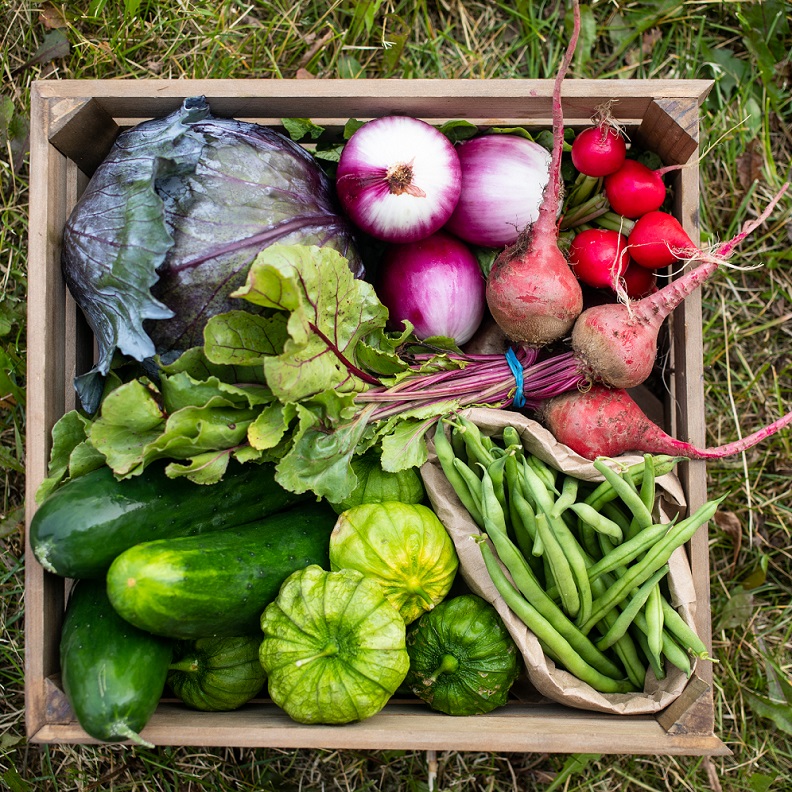It started as a simple idea: Local produce should be easily accessible. Then it became a reality. Eight years after launch, it’s a key part of a growing movement. The Good Acre is a 501(c)(3) nonprofit formed in 2014 with support from the Pohlad family foundation. It is focused on improving the local food system for diverse, independent farmers and increasing access to healthy produce for all consumers, regardless of income. Today, private philanthropy and government grants, along with a small but steady stream of earned revenue from operations, provide The Good Acre’s funding.
On a modest acre of land in Falcon Heights, Minnesota, The Good Acre runs programs – such as grower support, vocational culinary training, and food warehousing and distribution – that support a sustainable food system in the state. Bremer is proud to be The Good Acre’s banking partner, and equally proud to share their commitment to thriving communities.
The Good Acre’s executive director, Theresa McCormick, is an enthusiastic advocate for both The Good Acre and Bremer.
“We believe that local produce can and should be the first and most accessible choice for buyers because it’s the foundation for a healthy community, and Bremer’s experience and reputation with both nonprofit and agriculture clients made them the ideal bank for us. While they have been a trusted partner for more than three years, we were especially grateful for their help in securing PPP loans for us during the pandemic,” she said.
As a result of the PPP loans, The Good Acre was able to retain their entire staff of 14 employees and shift operations to function effectively during a global pandemic. In addition, the PPP loans provided the foundation for The Good Acre’s Local Emergency Assistance Farmer Fund (LEAFF).
“LEAFF is a collective effort among agriculture and hunger relief nonprofits that creates a new market for growers,” McCormick said. “With this program, we are addressing food access while strengthening local growers and our food system simultaneously.”
McCormick is encouraged by Minnesota’s increasing focus on local food purchasing and equity during the past few years.
“Since we started working with Bremer, we’ve almost tripled the amount of food that’s going through our food hub,” McCormick said. “And right now, we’re running a 50 percent increase over last year. There is meaningful community conversation happening around how dollars can truly build community in our own backyard, and we’re a part of a growing community of food hubs, working together to support a local food system.”
Following two years of deep learnings during their acute pandemic response, The Good Acre is now exploring what continued sustainability looks like and how much scaling up makes sense for their organization.
“Bremer is our partner in helping us determine the infrastructure needed to support our growth plan. We lean on them as our financial experts as we strategize our future growth,” McCormick said. In addition to matters of scale, McMormick and team are thinking about issues like climate change and its impact on growers, land access, and other matters critical to ensuring an equitable and resilient local food supply.
“Bremer understands the unique complexities of a nonprofit business, and they take a genuine interest in our strategies for growth, in addition to our day-to-day banking needs. Every nonprofit needs a banking partner like Bremer,” McCormick said.
Bremer is equally complimentary of The Good Acre.
“It is a privilege to work with Theresa and her team,” said Bremer banker Jackie Shea. “Through their support of local farmers to the work they do with school chefs to create healthy options for students, they are helping to strengthen our local communities in many different ways.”
McCormick is seeking to engage even more stakeholders in The Good Acre’s mission to connect and strengthen farmers, food makers and communities through good food.
“We’d like to see everyone using their power to ask questions about local food … to be a part of the conversation. At your workplace, school and grocery store, ask leaders about their commitment to buying local food and the percentage of their food that is sourced locally,” she said.
In addition to local advocacy, community members can join The Good Acre’s Farm Share program to bring local food to their tables. Options include a full-season share, a smaller harvest-season share and a late-season share, designed to provide members with hearty locally grown storage crops long after the growing season has ended. As a nonprofit food hub, The Good Acre’s Farm Share program is a great example of their mission in action — supporting local farmers with fair prices and technical support while providing the community with access to a beautiful array of healthy food all year round.
“We are aiming to build community wealth by building community health,” McCormick said. Bremer sees that as a tremendous win-win.
